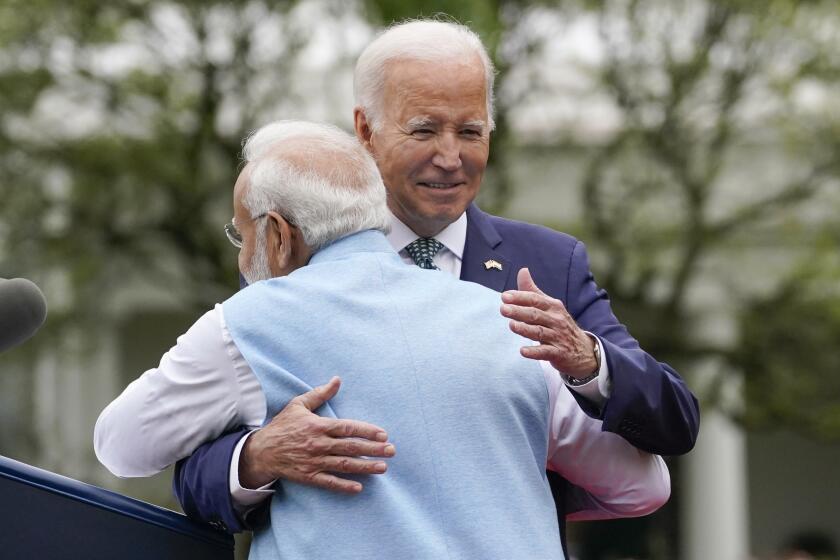Japan and India reject Biden’s comments describing them as xenophobic countries

- Share via
TOKYO — Japan and India on Saturday decried remarks by President Biden describing them as “xenophobic” countries that do not welcome immigrants, which the president said during a campaign fundraising event earlier in the week.
Japan said Biden’s judgment was not based on an accurate understanding of its policy, while India rebutted the comment.
Biden grouped Japan and India as “xenophobic” countries, along with Russia and China as he tried to explain their struggling economies, contrasting the four with the strength of the U.S. as a nation of immigrants.
Japan is a key U.S. ally, and both Japan and India are part of the Quad, a U.S.-led informal partnership that also includes Australia in countering increasingly assertive China in the Indo-Pacific.
Just weeks ago, Biden hosted Japanese Prime Minister Fumio Kishida on an official visit, as the two leaders restated their “unbreakable alliance” and agreed to reinforce their security ties in the face of China’s threat in the Indo-Pacific.
Indian Prime Minister Narendra Modi also made a state visit to Washington last year, when he was welcomed by business and political leaders.
President Biden emphasized the power of democracies as he hosted Indian Prime Minister Narendra Modi at the White House.
The White House said Biden meant no offense and was merely stressing that the U.S. was a nation of immigrants, saying he had no intention of undermining the relationship with Japan.
Japan is aware of Biden’s remark as well as the subsequent clarification, a Japanese government official said Saturday, declining to be named due to the sensitivity of the issue.
The official said it was unfortunate that part of Biden’s speech was not based on an accurate understanding of Japanese policies, and that Japan understands that Biden made the remark to emphasize the presence of immigrants as America’s strength.
Japan-U.S. relations are “stronger than ever” as Kishida showed during his visit to the U.S. in April, the official said.
President Biden welcomed Japanese Prime Minister Fumio Kishida to the White House for talks on the security situation in the Pacific, and more.
In New Delhi, India’s External Affairs Minister S. Jaishankar on Saturday also rebutted Biden’s comment, saying India was the most open society in the world.
“I haven’t seen such an open, pluralistic, and diverse society anywhere in the world. We are actually not just not xenophobic, we are the most open, most pluralistic and in many ways the most understanding society in the world,” Jaishankar said at a round table organized by the Economic Times newspaper. Modi, however, has come under criticism from human rights advocates amid backsliding on press, religious and other freedoms.
Jaishankar also noted that India’s annual GDP growth is 7% and said, “You check some other countries’ growth rate, you will find an answer.” The U.S. economy grew by 2.5% in 2023, according to government figures.
At a hotel fundraiser Wednesday, where the donor audience was largely Asian American, Biden said the upcoming U.S. election was about “freedom, America and democracy” and that the nation’s economy was thriving “because of you and many others.”
“Why? Because we welcome immigrants,” Biden said. “Look, think about it. Why is China stalling so badly economically? Why is Japan having trouble? Why is Russia? Why is India? Because they’re xenophobic. They don’t want immigrants.”
Japan has been known for a strict stance on immigration. But in recent years, it has eased its policies to make it easier for foreign workers to come and stay in Japan as a way to mitigate its declining births and rapidly shrinking population. The number of babies born in Japan last year fell to a record low since Japan started compiling the statistics in 1899.
India, which has the world’s largest population, enacted a new citizenship law earlier this year by setting religious criteria that allows fast-tracking naturalization for Hindus, Parsis, Sikhs, Buddhists, Jains and Christians who fled to India from Afghanistan, Bangladesh and Pakistan, while excluding Muslims.
Modi has faced criticism over the legislation’s exclusion of Muslims, a rise in violence against Muslims and other religious minorities by Hindu nationalists, and the conviction of India’s top opposition leader, Rahul Gandhi, for mocking Modi’s surname.
In 2005, the U.S. revoked Modi’s visa, citing concerns that, as chief minister of Gujarat state, he did not act to stop communal violence during 2002 anti-Muslim riots that left more than 1,000 people dead. An investigation approved by the Indian Supreme Court later absolved Modi, but the stain of the dark moment has lingered.
Associated Press writer Yamaguchi reported from Tokyo. AP writers Ashok Sharma in New Delhi and Seung Min Kim in Washington contributed to this report.
More to Read
Sign up for Essential California
The most important California stories and recommendations in your inbox every morning.
You may occasionally receive promotional content from the Los Angeles Times.












